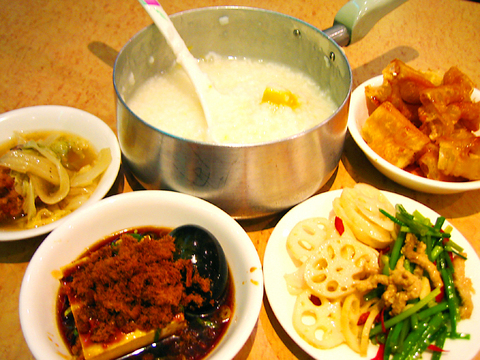Congee is a bland food. That's why it's a breakfast food in countries from Vietnam to Japan. But at the congee restaurants on Fuxing Road between Da'an and Technology Building MRT stations, it's a midnight snack.
Xiao Lizi is one of those restaurants with floor-to-ceiling windows revealing an ample buffet. A hostess stands outside telling passersby to stop for a snack. The place is less flashy but more popular than the others on either side and both floors fill up by 8pm, with customers streaming in and out into the wee hours of the morning. With a clean and simple decor, it's the perfect place to take a breather from your night on the town.
Congee can suffer from bad texture, which just compounds the problem of its blandness. But the congee you'll find at Xiao Lizi is a far cry from the leftover rice soaking in milky water that visits many a breakfast table in Taiwan. The ingredients are simple enough -- rice and water -- but a good consistency is difficult to attain with congee. If you cook it for too long, the rice grains disintegrate -- too short and the broth will be too watery. After cooking, the excess water can be drained to create a Western porridge-like consistency or left in to make it more like a soup. Xiao Lizi's congee is somewhere in between. Chunks of yam are thrown in to sweeten and thicken the mixture and the result is a pot of smooth, glowing goo.

PHOTO: MEREDITH DODGE, TAIPEI TIMES
The buffet table is the other option at Xiao Lizi. The first thing you must remember to put on your tray is a bowl of youtiao -- a stick of fried bread cut into sections to be soaked in the congee until it's tender and squishy.
Another typical congee side dish is thousand-year egg. One of the substances used to preserve the eggs (is it the charcoal or the lime?) reacts strangely with sweet flavors and if you take a bite of congee after a bite of the thousand-year egg without thoroughly rinsing your mouth, you will be greeted with a most unpleasant bitterness.
I found that, in general, the sweeter dishes went best with the congee, especially the deliciously crunchy lotus root and the tender leeks. If your stomach is up for it at that time of night, there are many other tempting dishes to try: stinky tofu, kung pao chicken, and several hearty stews. A selection of greens can be stir-fried or boiled to order.
If the thought of eating salty, fried dishes with sweet porridge turns you off, just ask for a pot of steamed rice instead.

The People’s Republic of China (PRC) invaded Vietnam in 1979, following a year of increasingly tense relations between the two states. Beijing viewed Vietnam’s close relations with Soviet Russia as a threat. One of the pretexts it used was the alleged mistreatment of the ethnic Chinese in Vietnam. Tension between the ethnic Chinese and governments in Vietnam had been ongoing for decades. The French used to play off the Vietnamese against the Chinese as a divide-and-rule strategy. The Saigon government in 1956 compelled all Vietnam-born Chinese to adopt Vietnamese citizenship. It also banned them from 11 trades they had previously

Growing up in a rural, religious community in western Canada, Kyle McCarthy loved hockey, but once he came out at 19, he quit, convinced being openly gay and an active player was untenable. So the 32-year-old says he is “very surprised” by the runaway success of Heated Rivalry, a Canadian-made series about the romance between two closeted gay players in a sport that has historically made gay men feel unwelcome. Ben Baby, the 43-year-old commissioner of the Toronto Gay Hockey Association (TGHA), calls the success of the show — which has catapulted its young lead actors to stardom -- “shocking,” and says

Jan. 12 to Jan. 18 At the start of an Indigenous heritage tour of Beitou District (北投) in Taipei, I was handed a sheet of paper titled Ritual Song for the Various Peoples of Tamsui (淡水各社祭祀歌). The lyrics were in Chinese with no literal meaning, accompanied by romanized pronunciation that sounded closer to Hoklo (commonly known as Taiwanese) than any Indigenous language. The translation explained that the song offered food and drink to one’s ancestors and wished for a bountiful harvest and deer hunting season. The program moved through sites related to the Ketagalan, a collective term for the

Inside an ordinary-looking townhouse on a narrow road in central Kaohsiung, Tsai A-li (蔡阿李) raised her three children alone for 15 years. As far as the children knew, their father was away working in the US. They were kept in the dark for as long as possible by their mother, for the truth was perhaps too sad and unjust for their young minds to bear. The family home of White Terror victim Ko Chi-hua (柯旗化) is now open to the public. Admission is free and it is just a short walk from the Kaohsiung train station. Walk two blocks south along Jhongshan